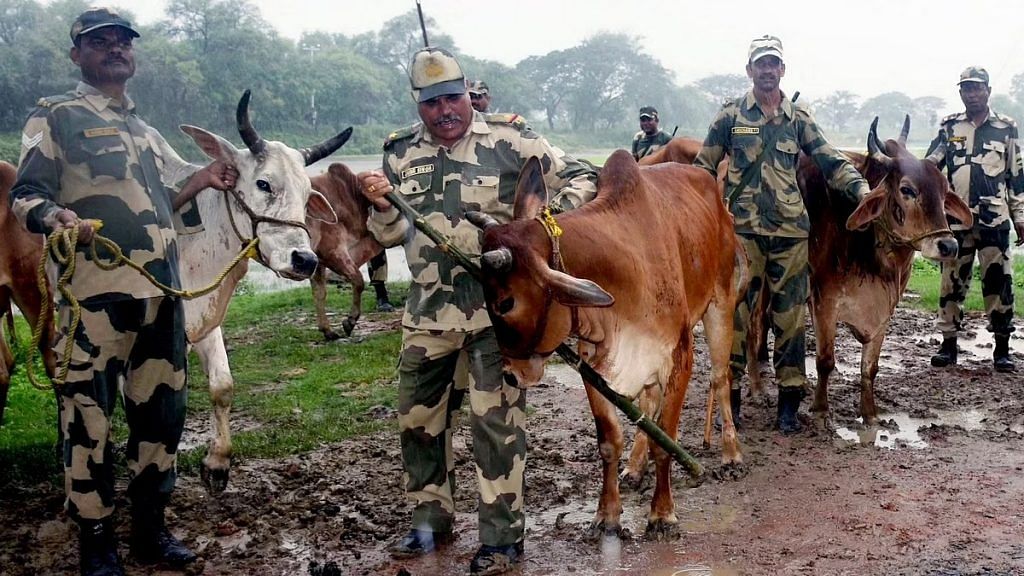New Delhi: Thousands of ailing and dying cattle arriving at the borders every day is making it difficult for the Border Security Force to do its primary duty of securing the borders, BSF Director General Pankaj Kumar Singh is learnt to have told a Parliamentary standing committee.
Singh, according to persons in the know of the panel’s deliberations, Monday pointed to a missive from the central government instructing advocating the BSF to take measures for ‘gau raksha’ (cattle protection), as well as pressure from animal rights groups to ensure the well-being of the bovines.
In his response to a BJP MP’s queries on cattle smuggling, Singh is learnt to have told the Standing Committee of Home Affairs that the problem is so severe that the BSF’s actual mandate is sometimes jeopardised, said a person in the know about the meeting.
Cattle smuggling is a major issue along the India-Bangladesh border. Cattle seizures by the BSF on the eastern front dropped by 53 per cent to 21,917 last year.
A person aware of the deliberations told ThePrint that the issue was initially raised by the members of the standing committee and inputs were sought from the BSF to make recommendations.
“Lack of proper resources is leading to the death of cattle which is a matter of concern. Hence, inputs were asked of the BSF to make recommendations,” the person said.
ThePrint reached the BSF chief, who declined to comment on the matter. Committee chairman Abhishek Manu Singhvi did not respond to ThePrint’s request for comment.
Also Read: ‘Have corruption cases against CBI, ED, BSF’: Mamata warns central agencies of tit-for-tat action
BSF jurisdiction
At the meeting, opposition MPs also questioned the Centre’s 2021 notification, which increased the BSF’s jurisdiction to 50 km instead of the earlier 15 km radius along the borders with Pakistan and Bangladesh, alleging that the decision was taken without consulting with the states.
Earlier, the BSF could only carry out arrests, confiscations, and searches up to 15 km from the borders in Punjab, West Bengal and Assam. The order, however, reduced the BSF’s reach in Manipur, Mizoram, Tripura, Meghalaya and Nagaland by 30 km. In Gujarat, the jurisdiction was reduced from 80 km to 50 km.
The Ministry of Home Affairs had defended the decision of extending the BSF’s jurisdiction along Punjab, West Bengal and Assam, citing security issues such as cattle smuggling and drone threats.
The decision had led to a political uproar, with the opposition calling it an “attack on federalism”. West Bengal Chief Minister Mamata Banerjee had asked the state police to keep an eye on activities of the BSF.
During his deposition, Singh showed a film to make his point that similarities in culture, language and food make it difficult for a distinction to be made in the border areas about which person belongs where, said the above-mentioned person.
“Out of the 23 districts in West Bengal, at least 10 have been affected by this decision as they share a border with Bangladesh. These 10 districts together account for 21 of the 42 Lok Sabha seats for Bengal which indicates that there can be political implications as well,” a Bengal MP told ThePrint, not wanting to be named.
“The notification brings nearly one-third of West Bengal, and most parts of the geopolitically sensitive northern Bengal, under the BSF jurisdiction where they will be able to conduct searches and make seizures and arrests without intimating the local police,” the MP added.
Committee chairman Singhvi, meanwhile, asked the BSF to increase the representation of women in the force from the current 3 per cent, said the person aware of the deliberations.
(Edited by Tony Rai)
Also Read: Don’t reduce BSF from first-class border guarding force to third-class police force in states
